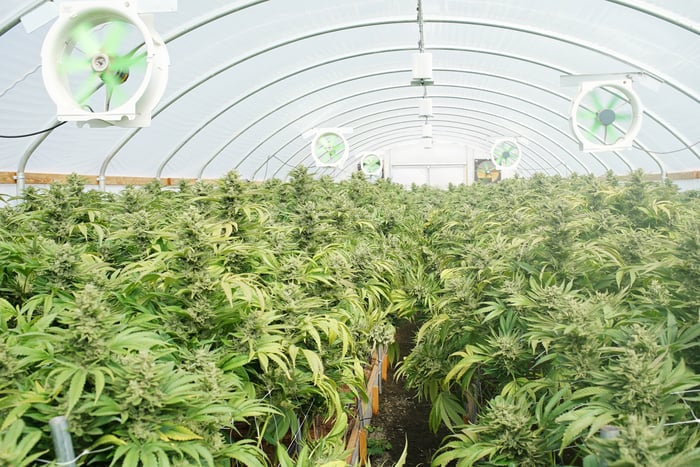Few stocks have performed as well as marijuana stocks over the trailing-two-year period. A quick look at sales growth within the industry, as well as the public's perception toward pot, speaks volumes about how marijuana stocks have so vastly outperformed the broader market.
In terms of sales, cannabis research firm ArcView notes that North American legal marijuana revenue increased 33% to $9.7 billion in 2017. By 2021, this figure is estimated to near $25 billion, or 28% on a compound annual basis. And with regard to favorability, five national polls conducted in the U.S. over the past year have shown support ranging from 59% to 64% in favor of legalizing marijuana.

Image source: Getty Images.
However, it's not the U.S. marijuana industry that's caught the attention of investors. Instead, all eyes are on Canada, which is expected to become the first developed country in the world to legalize adult-use cannabis by this summer. In doing so, it'll be opening the door to an estimated $5 billion (or more) in added annual sales, which comes on top of what growers are already generating from medical weed sales and via exports to medically legal countries.
Cronos Group wants its piece of the Canadian legal cannabis pie
With the strong likelihood of legalization on the horizon, Canadian marijuana growers have been hard at work expanding their capacity as quickly as their balance sheets will allow. One such company that's aiming to get its slice of the Canadian cannabis and export market is Cronos Group (CRON -0.24%).
If the name sounds somewhat familiar, that might be because Cronos Group was the very first over-the-counter (OTC)-listed marijuana stock to uplist to the Nasdaq earlier this year. By uplisting to a more recognized exchange, Cronos opens the door to improved trading liquidity, as well as institutional investors who might otherwise not invest in OTC-listed stocks.
Cronos Group is primarily an investment company that's worked its way into the industry by acquiring stakes in three core assets: Original BC, Peace Naturals, and Whistler Medical Marijuana Company. Cronos has complete ownership of the first two companies, while maintaining a minority ownership position in Whistler Medical Marijuana.

Image source: Getty Images.
Last week, Cronos reported its full-year results from fiscal 2017, which lent promise to what lies ahead. For the year, the company recorded $3.17 million in sales, up more than 600% from the prior-year period.
More importantly, recent greenhouse construction at Peace Naturals is complete, meaning these facilities are fully operational. Furthermore, a fourth building spanning 286,000 square feet is expected to begin production in the second half of 2018. As noted by my colleague Keith Speights, Peace Naturals is on track to generate 40,000 kilograms of annual capacity.
Is Cronos Group grossly overvalued?
On the surface, this all might look great to investors. But on a grander scale, Cronos Group just might be the most overvalued grower of the bunch.
While keeping in mind that valuation is in the eye of the beholder, there are two particular issues that stand out in my eyes: production capacity and dilution.
The biggest issue I have with Cronos Group is what it'll bring to the table from a production perspective relative to its peers. If we include the expected 40,000 kilograms from Peace Naturals, along with its Israeli joint venture (Gan Shmuel), these two primary sources of production work out to about 64,000 kilograms annually. Add in a few other smaller joint ventures and projects and Cronos Group might have a shot at producing 70,000 kilograms annually at full capacity.

Image source: Getty Images.
Right now, Cronos Group commands a market cap that's just north of $1 billion. By comparison, Aphria (NASDAQOTH: APHQF) has 230,000 kilograms of fully funded capacity under construction, and it's only valued at $1.6 billion. Aphria One and Aphria Diamond (the company's joint venture with Double Diamond Farms) both dwarf Peace Naturals with respective annual yields of 100,000 kilograms and 120,000 kilograms. This is noteworthy since the cannabis industry often benefits from economies of scale. In other words, an increase in production usually leads to a decrease in costs, at least on a per-gram basis.
Understandably, comparing production potential versus market cap is somewhat flawed since it doesn't take into account margins, which is what really matters. But with its larger facilities and access to a dozen international markets following its Nuuvera acquisition, Aphria seems to be in better shape from a margin perspective as well.
The bottom line is that most growers with annual production estimates that are in the neighborhood of what Cronos Group should deliver are valued at less than half of the company's current $1.04 billion market cap.
More dilution is on the way
The other concern I have, which is pretty typical throughout the marijuana industry, is the ongoing potential for dilution.

Image source: Getty Images.
Put plainly, marijuana stocks don't have much in the way of access to traditional banking services. Since cannabis is illegal at the federal level, banks tend to avoid offering services for fear of being slapped with a monetary penalty or a criminal charge. This leaves publicly traded pot stocks to raise capital via bought-deal offerings. A bought-deal offering is a means of selling common stock, convertible debentures, stock options, and/or warrants to an investor or group of investors in order to raise capital.
The good news for Cronos Group is these bought-deal offerings have allowed it to raise sufficient capital to complete its production expansion projects. The bad news is that its outstanding share count has ballooned higher, which dilutes the value of existing shares and can weigh down earnings per share in future quarters.
In its filing with SEDAR in Canada, it shows how the company's Canadian-listed share count has grown from 78.2 million shares at the end of 2016, to 134.8 million on a weighted average basis by the end of its latest fiscal year. Of course, this share dilution is nowhere near finished. There are more than 38 million warrants and over 3 million stock options still outstanding. On a diluted basis, Cronos Group's share count could balloon to nearly 177 million shares in the coming couple of years.
When taking into account the company's relatively mid-level production and heavy dilution, I'd feel pretty comfortable in suggesting that this may very well be the most overpriced marijuana grower.





